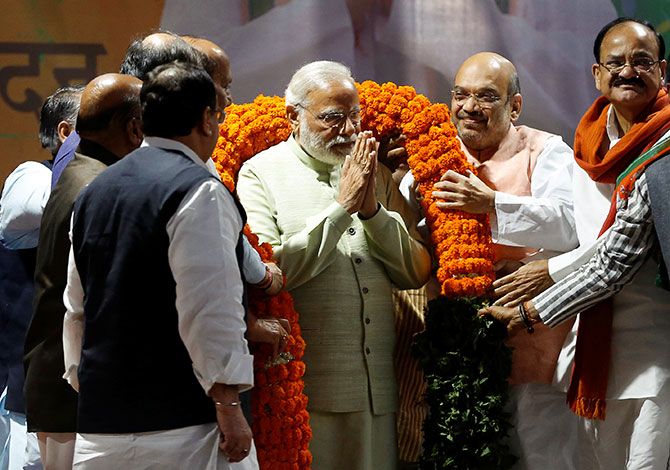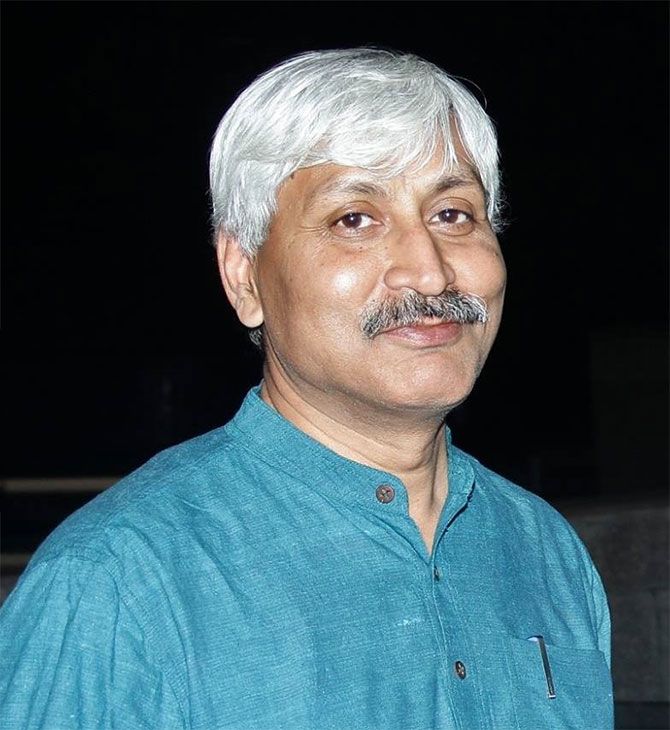'The only narrative before India is what Modi and the BJP is presenting.'
'Nationalism has been taken as a serious plank by the BJP and RSS.'
'They want to keep the nationalism thing alive to make people forget the economic reality.'

Apoorvanand, a professor at Delhi University and well-known commentator on political issues, explains to Rediff.com's Shobha Warrier why he is concerned about the Bharatiya Janata Party's massive victory in Uttar Pradesh.
The UP election results have been described by many as the second Modi wave. Some even call it a Modi tsunami. Do you agree?
I don’t know whether to call this a Modi wave or Modi tsunami or not, but it is definite that the people of UP have gone with what Modi and the BJP were commenting on.
This time it was unambiguous.
Was it the so-called social engineering managed by Amit Shah or Narendra Modi's vikas mantra that gave the BJP a massive victory?
I don't know why we are talking about vikas mantra because this time, from the beginning, the BJP was unambiguous about its plank.
They brought back the Ram Mandir issue. The BJP president talked about Akhilesh Yadav's discriminatory state polity relentlessly and the prime minister tried to tell the people of UP that jobs were given to Muslims.
The plank was not development at all; it was definitely a Hindutva plank.
Yes, there was social engineering. It was done not only in these 2, 3 months, the BJP has been doing it for the last 10, 15 years in UP and the other states.
What it has learnt from the Social Justice movement was the need to accommodate the backward castes and Dalits in its fold.
The Social Justice movement in Bihar had a strong Yadav leader and in UP, there were two leaders -- one a Yadav (Samajwadi Party leader Akhilesh Yadav) and the other a Jatav (Bahujan Samaj Party leader Mayawati).
Given the extreme nature of our society, when Yadavs emerged at the top, the other sub castes -- which we call backward castes, but known in their areas by their caste -- felt left out.
So, it is not a homogenous growth. When it comes to power, the others feel that they don't have a share and only the Yadavs enjoy it.
In Haryana, the BJP targeted the Jats.
In Maharashtra, they targeted the Maratha hegemony and it worked for them very cleverly.
In UP, they targeted the other backward castes and the non-dominant Dalits.
In UP, they started a train in the name of Suhaildev, considered a leader by a particular community. They even had a campaign in the area surrounding Suhaildev.
The fact is Ghazi Mian is the cult hero of both the Hindus and Muslims, but the BJP changed the folklore and made Suhaildev the hero.
So, contrary to what others would like to believe, that the BJP was above caste, what it has done is group the other backward castes and the non-Jatav Dalits in a very clever manner.
You said the BJP had the Ram temple on its plank, but at no rally did Narendra Modi speak about Hindutva or the Ram temple; he always talked about development...
For once I want to agree with what the MIM leader (Asaduddin) Owaisi says, that Narendra Modi's username is development and his password is Hindutva.
So, if you want to open his system, you have to type Hindutva.
Narendra Modi did it very cleverly in both Bihar and UP. I don't know why journalists are missing it.
If you follow all his speeches, you will see that he always spoke about discrimination that is happening there and he played it very cleverly.
Most of the people do not know Hindi well and cannot understand the nuanced way he is telling the Hindus that they being discriminated against.
He said, what had happened till now was 'kuch ka saath, kuch ka vikas.'
What he was effectively telling them was the kuch are the minorities.
What he meant in Bihar and UP was Muslims need to be cornered and need to be pushed out.
He wanted them to deal with the kuch firmly.
This was his message in all his speeches and not vikas mantra.
It appears out of the 115 seats in Muslim dominated areas in UP, the BJP won 85 seats. How do you explain this?
Look at this in a different way. Before this mandate, Akhilesh Yadav had come with a decisive mandate.
It was not called a mandate above caste, but this time, why do you want to call this a mandate above caste and religion?
What happened was clever social engineering.
The caste equation was understood and used carefully to bring them (the BJP) to power.
In the Muslim dominated areas, the BJP saw to it that the others consolidated against the Muslims.
In Bihar, this was the story. Some Muslims might have voted for the BJP. I read someone say yesterday (Sunday) that they wanted to say, just spare our lives.
So, you are saying this was not a vote beyond caste and religion, but clever social engineering?
Definitely it is not beyond caste and religion. It has very much to do with caste.
I still remember (Bihar's BJP leader) Sushil Modi giving a statement that the BJP would be the party that would give India its first OBC prime minister.
Is it a statement beyond caste or a casteist statement?
If it had come from Lalu Yadav or Mayawati or Rahul Gandhi, everybody would have pounced on them saying they were talking the casteist language.
Modi himself portrays himself as a man from the other backward castes.
In UP, why do you think the Dalits deserted the BSP?
We tend to speak in very broad terms. Dalits include many sub castes and there is a hierarchy there.
Those in the lower rung are discriminated against even now.
Their immediate oppressor is not a Brahmin or someone from the backward caste, but those in the upper level among Dalits.
Social justice politics failed because it couldn't fashion a universal language.
The BSP is seen as a Jatav party and not a Dalit party. The Dalit is a much broader category.
Mayawati has failed to establish herself as a Dalit leader who has the universal language.
The BJP says schemes like Jan Dhan Yojana, Ujwala, etc helped it win over the poor. Do you agree?
These schemes have also played a role, yes.
Why only Ujwala, demonetisation also helped them win the votes of the poor.
Demonetisation was portrayed as something that hit the rich and the corrupt hard and people in general bought this line.
So, there was an imaginary satisfaction among the poor that the rich were hit hard by demonetisation.
People also believed that their hardship was because of the bankers and not Modi.
They bought the line that Mod did the right thing and it was the bankers who messed it up.

Why do you think people trust Narendra Modi?
I am coming to terms with this new reality.
What was before Modi? A total vacuum in terms of communication.
Democratic politics works through dialogue and speeches.
Somebody has to talk to the people.
If you go back three years, there was complete silence.
Manmohan Singh was not speaking and Sonia Gandhi was not speaking.
No Congress leader was speaking.
Arvind Kejriwal entered the scene and it was only shouting people heard.
There was a general sense of despondency.
Now comes a man who speaks. And he talks relentlessly.
He talks to the people. And people want to hear him speak.
The only narrative before India is what Narendra Modi and the BJP is presenting.
No other credible narrative is presented by the Congress or the Left or the other regional parties.
In democracy, the power of rhetoric works.
People see in Narendra Modi a man who is talking to them and who is presenting himself as a man among them.
When he says that he was one among them and he has risen to the level of PM, they see in him a kind of revolt against the elite.
Do you think he has become bigger than the party?
Yes, he has. In 2013, I wrote an article that Narendra Modi was to the BJP what Stalin was to the Communist party of the Soviet Union.
Stalin decimated the politburo of the Communist party. All the comrades of Lenin were either killed or sidelined or sent into exile.
This has happened to the BJP; all the stalwarts of the BJP are sidelined and those who exist, exist because of Narendra Modi.
Even the RSS is following the dictates of Narendra Modi.
Do you feel Narendra Modi and the BJP are heading for a long innings in India?
At this juncture, it seems so. The other parties are stunned into silence.
They will have to gather their wits, stand up on their feet and start thinking.
They have to look at the elements that are resisting the BJP even now and work on them.
What kind of impact will the UP results have on Indian politics?
In parliamentary terms, it will change the composition of the Rajya Sabha, it will give an absolute majority for the BJP in both the Lok Sabha and Rajya Sabha.
So, it will be able to push all its bills comfortably.
In political terms, it may affect people from other states.
They may feel that the BJP is the party which should be trusted and they would tend to go with it.
Gujarat may go its way, similarly, Rajasthan.
So, in all coming elections, the BJP may able to fight anti-incumbency and win.
Then the language of the BJP will be the language of Indian politics.
Will victory in the 2019 general election be easy for the BJP?
At this juncture, it seems so.
They were saying till now that they had not been able to push the bills because they didn't have the majority in the Rajya Sabha.
They also will have their own President, vice-president. There won't be any discordant voice anywhere.
Of course, expectations are there.
If the economy doesn't work, if they are not able to create buoyancy in manufacturing and agriculture, they will find it tough to fulfil their economic promises.
That can create disillusionment among the people as expectations are huge.
That is one possibility.
The other possibility is if people are fed culture instead of bread. I feel we will see a very fierce cultural battle in the next three years.
Nationalism has been taken as a serious plank by the BJP and the RSS. It is a very well thought out strategy that they have.
They want to keep the nationalism thing alive to make people forget the economic reality.
Are we seeing the Indira Gandhi days of the 1970s when she was the undisputed leader all over India?
What we are seeing is the reconfiguration of India with Muslims and Christians being made irrelevant with majoritarian politics.
Narendra Modi is just an instrument, an important link in the whole story.
After all, he is the son of the RSS, and the RSS has found an effective voice in Narendra Modi.
I see the BJP ruthlessly implementing majoritarian politics all over.
Indira Gandhi's period was different. She was authoritarian and she did play with a majoritarian impulse, but the decisiveness with which majoritarian politics is being implemented now is something we have to be concerned about.
I am worried, concerned and perturbed because I cannot be neutral right now. But I have not given up hope.
MUST READ features in the RELATED LINKS below.










